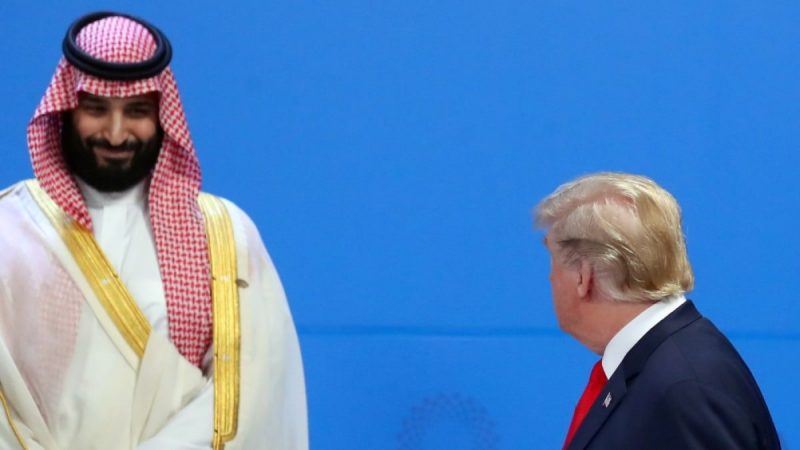Bin Salman Is Now One of Us, Part Five
Our narrative about Saudi’s Bin Salman has reached the point where Trump announced his candidacy in the US. We narrated how the highest-ranking Russian national security officials in their National Security Council, under Vladimir Putin’s program, were determined to support Trump, finding him the best option for disrupting the structure of the United States and overturning American democracy.
On the other hand, in the Middle East, various forces and diverse emirs gathered to unite behind a strange, unappealing, and very rare figure to support Trump. We reached the point in the story where we must discuss the federal investigations into foreign countries’ and agents’ interference in the 2016 elections to clarify the dimensions of the Arabs’ involvement in the US elections.
America, the Defenseless Country
Robert Mueller, the former FBI director, became one of the key political and security figures in America for several years following the 2016 elections. His successor at the head of the FBI appointed him to investigate foreign countries’ interference in the US elections, and he spent a long time as a special investigator preparing a lengthy and detailed report. In the end, due to Mueller’s considerations and existing obstacles, he could not bring Trump to court.
Nevertheless, the names of several countries emerged. Russia’s role in electing Trump was almost obvious, and to this day, uncovering the extent of Putin’s support for Trump troubles him. However, the role of specific countries needs to be examined more precisely and with a particular lens. It must be said that all the news about Putin’s support for Trump actually diverted attention from the role of other countries.
A serious reality revealed by Mueller’s extensive investigations on one hand and a wide range of other organizations’ investigations on the other was America’s defenselessness over the past decade against other countries’ interference and influence. Part of this serious weakness must be sought in the role of internal US political forces who welcomed any form of assistance, both domestically and from outside the US, for financial and political benefits.
Specifically, this defenselessness of America must be seen frankly and without reservation in the extensive network of American political lobbyists who are on foreign payrolls. Official institutions and political figures registered and known as lobbyists legally conduct financial transactions, information exchange, and cooperation with countries, organizations, companies, and foreign personalities.

What unfolded during the investigations, media coverage of activities, and everything Robert Mueller conducted in America is, in particular, one of the darkest parts of America’s judicial and political history. What was clarified and exposed were numerous files and documents of Russian and other countries’ electoral interference in the 2016 US elections, and important figures from Trump’s inner circle were identified as foreign agents both during Mueller’s investigations and in the broader scope of federal prosecution and FBI pursuits, all during Trump’s own time. Among them, one person became significant.
Nader, a Rare Case
George Nader, also known by his Arabic pronunciation as George Nader, a Lebanese-American known before the 2016 elections and its developments in America as a lobbyist, businessman, mediator, and a reliable figure for American conservatives in the Middle East. George Nader should be considered one of the significant figures involved in the infamous Iran-Contra story, playing a special role in freeing American hostages in Lebanon amidst the developments related to the sinister interactions of a specific circle in Iran with rebellious and law-breaking figures in the Reagan administration.
Nader had special relationships with Shia figures in Iran and Iraq, and simultaneously with all these interactions, he seriously connected with George W. Bush’s administration and his accompanying conservatives. From this point in Nader’s story, it should be noted that this style of deceitful lobbyists skillfully builds relationships with all political factions to maintain a balance in their future interests.
During Robert Mueller’s investigations, it became clear that what was previously known about George Nader’s relationship with Erik Prince, the notorious conservative figure and owner of the infamous and lethal Blackwater company, was very minimal. The depth of cooperation between these two was quite unusual, and it was George Nader who was hired by Erik Prince to secure security contracts for Blackwater and the military-security group under the official title of advisor.
George Nader, leading up to the 2016 elections, orchestrated colorful stories of lobbying and deceit, effectively becoming known as one of the influential Middle Easterners in Washington who, without being a citizen of any specific Arab or Persian Middle Eastern country, could comfortably advance the political businesses of Middle Eastern emirs from all regional countries in America.
The Election Gathering on a Yacht
In 2015, George Nader prepared for a specific period. The developments in the Middle East and America were heading in a direction that set the stage for new initiatives and a comprehensive and special plan. The nuclear agreement between Iran and the US and its allies was made in two phases with extensive media coverage, and its consequences were unfolding. Netanyahu in Israel created widespread controversies against the Obama administration, officially clashing with John Kerry in front of cameras and delivering a speech in Congress against Obama and the nuclear agreement.
In the Persian Gulf, Arab emirs were stabilizing after the Arab Spring and clarifying the boundaries between friend and foe. Saudi Arabia and the UAE, with elderly leaders and young, adventurous crown princes, were seeking to make history. The behind-the-scenes interactions of these Arab emirs with the Israelis, the enmity and resentment of the Saudi, Emirati, and Bahraini crown princes with the Qataris, and the confrontation of these emirs with Erdogan because of the Arab Spring stories had become serious.
All these developments, along with the rise of ISIS and the setting of Iraq and Syria ablaze, further fueled the Arab emirs’ peak dissatisfaction with Barack Obama and the Democrats. Their hidden ties with the Israelis also paved the way for a new alliance. George Nader saw these conditions as the best opportunity.
In late 2015, as Trump was recognized as the main face of the Republican Party’s presidential campaigns, George Nader, along with Egyptian President Abdel Fattah el-Sisi, the crown princes of the UAE and Bahrain, and King Abdullah of Jordan, gathered on a luxurious yacht in the Red Sea. In this attractive gathering, he presented his special proposals and insisted on uniting these figures behind his plans.
It should be noted that the plans presented by George Nader to the Arab emirs were plans that, in their entirety and even in their details, were entirely dependent on the will and desire of these emirs. Implementing these plans, while Mohammed bin Salman had one hand in domestic affairs and preparing to maximize his power and the other hand in the Yemen story, was time-consuming and beyond the patience of the young, pleasure-seeking emir. At that time, bin Salman had not yet become the crown prince.
He had just begun his efforts to sideline the crown prince and establish himself as his father’s successor. The UAE’s crown prince was in a similar situation. George Nader’s plans were, however, sufficiently attractive. Nader’s plan to create a united Arab front to counter Iran and Turkey and align Arab-Israeli programs was not extensively detailed. The Israeli dimensions of the plan were not expanded, and there was no need for elaboration.
Both the Arab emirs’ relations with the Israelis behind the scenes in commercial interactions on one hand and security and espionage cooperation on the other were well-established. What was needed to create a united front to counter Iran and Turkey and begin a new era in the Middle East was a sympathetic government in Washington. George Nader introduced collaboration with Trump and aiding his election as the main solution and told those present at the yacht gathering that he could connect them to the Trump camp.
Bin Salman, Bin Zayed, and Trump Were All Played
As we mentioned, George Nader is one of those professional lobbyists and political and commercial game-makers who knows his job well. He, who was attentive to all aspects of the political game in the New World and the political games of the Middle East, could not accept the slightest risk. In parallel with the programs we mentioned and will mention later, he not only did not cut his relations with the forces opposing the structures he was associated with but also strengthened them.
This Mr. George Nader, who is now imprisoned, and we will explain why in the next section, connected the UAE crown prince’s money to Hillary Clinton’s campaign, alongside deposits into Trump’s accounts. This process of transferring money also dragged another Middle Eastern-connected figure into the fray and created many troubles.
He apparently met with Hillary Clinton and her husband Bill Clinton and discussed the UAE’s request for favor from the 2016 election candidate. Bin Salman was naturally unaware of this particular development and Nader’s cooperation with the Emiratis, just as he was apparently unaware that Mohammed bin Zayed was a more important figure for Nader and his American friends than he, who was still only the deputy crown prince.
George Nader also arranged other matters, including strengthening his relations with the Revolutionary Guards. The pre-existing relationships with senior Shia figures in Iraq and the so-called links with Iranians needed to be solidified to maintain a balance of interests for Nader in the future. He took this matter seriously in the latter half of the past decade and established newer and stronger ties with specific forces in Iran through Ammar al-Hakim.
The Arabs on the yacht were unaware of this either. At this point in the story, it must be said that the connections of those Arab emirs lacked a regular, strong, and powerful structure and function. The weaknesses and shortcomings in policy and execution were so serious that, for example, King Abdullah of Jordan did not remain a serious force in this group and front.
Continue following the narrative of Bin Salman’s electoral game and the role of the Arab and Israeli emirs and the rare role of Nader in the subsequent parts of the Bin Salman story.

